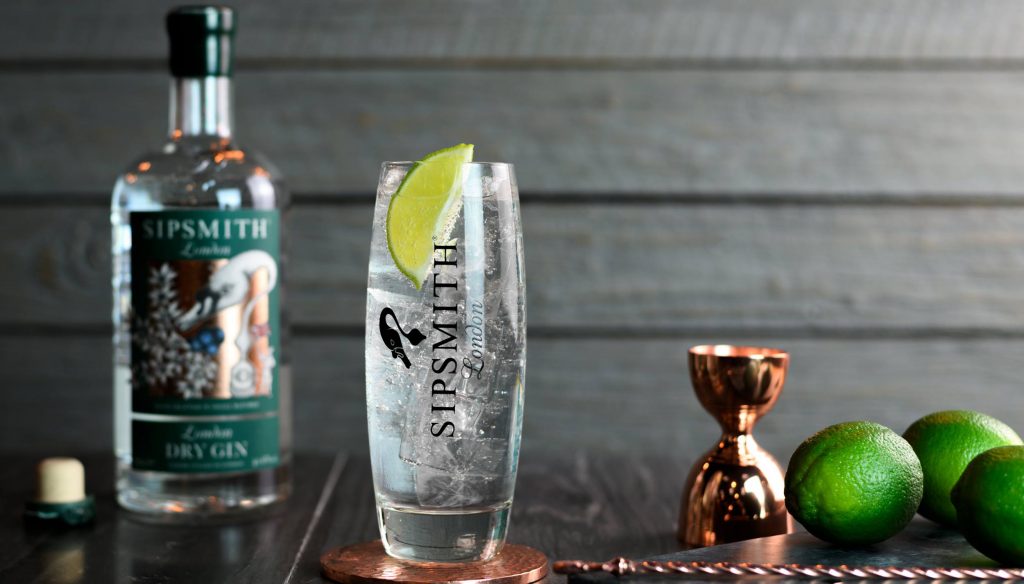April 9 is International Gin & Tonic day. For us, it’s kind of like the first taste of summer. We step outside, enjoy the spring air, and begin to prepare for the coming months filled with outdoor activities, barbecues, and the smell of fresh cut grass. One of our favorite gins is Sipsmith London Dry… and they know something about fresh cut grass, as they’re the official gin sponsor of Wimbledon.
At this point, Sipsmith is almost a household name, which is an incredible feat considering the brand was established in 2009. When it launched, it became the first copper-pot distillery to open within Greater London in 189 years. Since then, the distillery has gone from strength-to-strength, and now boasts 10 different offerings, including its original London Dry, the juniper-powered V.J.O.P., and, most recently, it added a Strawberry Smash Gin (only available in the UK). If you haven’t had a chance to try the brand, we fully recommend you get yourself some.
When it comes to drinks, the Gin & Tonic has a fascinating history. Both gin and tonic were initially created for medicinal purposes, and mixed together they became a way to prevent malaria in 1850s India. Toss in a couple limes, and you’ll be fighting scurvy too.
To celebrate International Gin & Tonic day 2021, we sat down with Sipsmith Master Distiller Jared Brown to discuss his first memories of the iconic drink, what goes into a bottle of Sipsmith, and how he likes to enjoy his own Gin & Tonic.

Spirited Zine: Just to start, when was the first time you had a Gin & Tonic? And what images do you associate with the drink?
Jared Brown: The first gin and tonic I had was in a maritime-themed bar on the shore of a large lake. The glass was emblazoned with a nautical pennant. It was a beautiful summer day and the lounge chairs at the water’s edge were filled with sunbathers, people were swimming in the warm water. Further out, the lake was covered with sailboats, and with motorboats pulling water skiers. Thus, I always taste summer and sailing and aquatic adventure in a gin and tonic.
SZ: Now that you’re a bit more experienced. Is there anything you would tell that younger version of yourself to do differently when it comes to enjoying that first G&T?
JB: That time, I wasn’t mixing so I was allowed to sit back and enjoy it and the company of the friends I was with and that perfect summer day. But mixing a great gin and tonic is an art.
Every element of a gin and tonic can be improved and will make a huge difference. Better gin is obvious. As is better tonic. But tonic from a smaller container is much better as tonic tends to quickly go flat, so only the first G&T made from a 2-litre bottle of tonic will be any good no matter what brand it is. Small bottles or cans are ideal. The proportion of gin to tonic is also essential. I prefer one part tonic to two parts gin (1.5oz gin to 3oz tonic—or if the tonic bottle holds 6.8oz, use half a bottle and add a touch more gin to maintain the ratio). Ice matters. I won’t reminisce about the ice in that first G&T I had, it was terrible and completely melted before I finished the drink. These days, I freeze small blocks of ice at home using them within two days, or I buy ice. Bought ice is generally very good quality.
SZ: What makes Sipsmith the perfect gin and tonic gin?
JB: Sipsmith is the quintessential expression of a classic London Dry Gin. It is traditional in its recipe, the botanicals, and the historic methods and distillation techniques we use to handcraft every drop of our gin. The result is a stunningly smooth, characterful spirit, both complex and aromatic – perfect for every Gin & Tonic.
SZ: Can you tell us a bit about the process that goes into making Sipsmith London Dry?
JB: It is a labor of love, with so much passion, care and attention to create our beloved gin! Alongside my team of dedicated Distillers, we watch over every drop of every batch and passionately believe this is the only way to hand craft spirits of this quality. Inspired by a classic recipe and distilled according to traditional techniques, Sipsmith is distilled using the one-shot method and crafted in genuinely small batches.
SZ: What botanicals are used in the making of the base gin?
JB: At Sipsmith, we use 10 classic gin botanicals to create our London Dry Gin – each of which contribute a different nuance and character to our spirit. These botanicals include juniper (but of course!), orange peel, lemon peel, coriander, orris root, liquorice, angelica root, cinnamon, cassia and almonds.
SZ: At this point, Sipsmith has a number of different spirits and gin varieties. What is the process you go through when you’re putting together a new release?
JB: Each product begins with an idea. There’s no telling what will trigger that idea. Sipsmith VJOP came about when I was working on our London Dry formula. There are three classic ways to handle the juniper: with maceration, without maceration, and using a vapor chamber or botanical basket. Each draws different flavours from the juniper, from the deepest savory and earthy notes to the lightest floral notes, yet no one had ever brought these three techniques together to capture the full juniper flavour spectrum in a single gin. We hammered away for years to perfect the technique and to make it in one shot rather than blending distillates (we make gin without compromise). By contrast, our Lemon Drizzle Gin was born on a Friday afternoon when our landlord sent us a traditional English lemon drizzle cake and one of our sales team, Freddie Campbell, suggested we chuck it in the still (we didn’t, but instead recreated the flavour with traditional botanicals such as fresh lemon peels, lemon verbena from my garden and later, lemon myrtle). We are constantly testing both new thoughts and long-lost formulae. I’m always digging through distilling books from past centuries.
SZ: Other than the London Dry variety, what Sipsmith gin pairs particularly well with tonic?
JB: Our Lemon Drizzle Gin, made with sun-dried lemon peels, lemon verbena and vapour-infused fresh hand peeled lemon, gives a sharp bite with strong florals notes also pairs particularly well with Fever Tree Mediterranean Tonic for a twist on the classic Gin & Tonic.

SZ: How do you make your perfect Gin & Tonic? And are there any variations you particularly enjoy?
JB: Our London Dry Gin is rich and balanced – perfect for a Gin & Tonic. I enjoy mine simple and classic – Sipsmith London Dry Gin with Fever Tree tonic, and a twist of lemon to garnish.
SZ: Is there anything you particularly like pairing with a G&T?
JB: For food pairings, I love seafood with a G&T. Salmon, smoked salmon, shrimp, oysters, fish and chips. Also, a good cheddar or stilton cheese pairs well with a G&T. It’s a remarkably versatile drink when it comes to food pairing.
For garnish in a G&T, I’m partial to a large piece of citrus peel. Grapefruit peel adds a delicious bitter note. Sliced kumquats are fun, as are freshly-frozen raspberries. They release a lot of colour as well.
SZ: How will you be celebrating Gin & Tonic day?
JB: I will be treating myself with a Sipsmith Gin & Tonic, of course! Our classic recipe below so you can enjoy one too.
- 1 part Sipsmith London Dry Gin
- 2 parts Fever Tree Indian Tonic Water
- Lime wedge or lemon twist
Fill a thin-rimmed highball glass up to the top with ice cubes. Pour Sipsmith London Dry Gin into the glass, top with tonic and garnish with a lime wedge or lemon twist.



